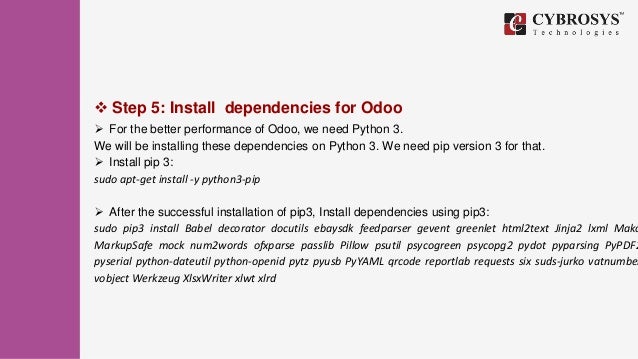- How To Install Pip3 On Ubuntu Mate
- How To Use Pip3 Install On Ubuntu 17.04
- How To Install Pip3 On Ubuntu 14.04
Pip is a command line tool that allows you to install software packages written in Python. Learn how to install Pip on Ubuntu and how to use it for installing Python applications. There is one more way to install packages in Ubuntu. It’s called Pip and you can use it to install Python-based.
My OS is Lubuntu 14.04 and the default Python version is Python 2.7.6, but in
- While on more modern versions of Ubuntu you could just sudo apt-get install python3-pip (and then use pip3), a Python 3 copy of pip was never packaged for 12.04. Therefore you need to follow the more old fashioned install route with easy_install.
- +1 Confirmed working on ubuntu 13.04 after sudo apt-get install -y python3.3 and using type pip3 – ehime Sep 27 '13 at 20:52 4 seems to be just pip3 now – Xaser Sep 8 '16 at 21:58.
it says I have Python 3.4 installed (when I run python3 -V it says I have Python 3.4.0). Does Python 3.4 come with a pre-installed pip? Because when I run

in a terminal it says that the program is currently not installed. With that said, assume I want to create a Django project which uses Python 3.4.3: do I first download python3-pip and then virtualenv and then do
? or is there a pre-installed pip 3 which comes with Python 3.4 which I already have installed?
Peter Mortensen3 Answers
Instead of installing python3-pip via apt-get or whatever (because the version in the repo is too old), download get-pip.py, switch to the folder where you saved it, and run
and it will install the latest version of pip for you. It may create a symlink to pip3, it may not, I don't remember.

You can then run
then use it to create your virtualenv, activate it, then use the pip installed inside it to get Django.
NOTE:
You can use the same copy of get-pip.py to install pip for Python 2. If you want to do that, however, I'd advise you to run
before you run
Whichever one you install last will take the pip filename. I don't know if Python 2 installs a command called pip2 (I know upgrading pip via pip does), but after you run the Python 2 install, run
to create a pip2 alias. You can then run the Python 3 install, which will overwrite /usr/local/bin/pip, then run
to create a pip3 command as well (if you get an error that the file already exists, then you're good to go). Now, instead of running pip when installing to your system site-packages and not knowing exactly which version you're calling, you can just use pip2 and pip3 to explicitly state the version you want.
In previous (X)Ubuntu versions it would be found under pip3 in your bash terminal, but such command didn't appear for me in Xubuntu 16.04.1 LTS. I founded pip (version python2.7), pip2 and pip2.7.
You know pip is in the repositories under python3-pip. If you want to use pip in the repo firstly you must have it installed.Answering your question,
How to use pip3 in Ubuntu:
Maybe for you is easier to have pip3 as a command. Then, you need to upgrade it:
How To Install Pip3 On Ubuntu Mate
It will create pip3 and pip3.5**but** it modifies pip too. It did for me, now if I do pip -V it shows (python 3.5). Maybe this replacement is the reason Ubuntu doesn't include the pip3 binaries as commands.
Update June 2019:
I'm using Ubuntu 18.04.x LTS since last year. I founded locally installed (in ~/.local) pip command pointing to pip2 (like python always points to python2) and pip3 pointing my last version of pip for python3.x as expected. So it is safe to install the package python3-pip from the repo. Although python2 was installed at system level at the beginning, it did not include pip or pip2 command in /usr/bin/
I have python 3.4.2 installed on a debian derived OS (bunsenlabs hydrogen) and I spent many hours trying to resolve the problem before finding this thread. Using get-pip.py worked for me, but not quite as shown in this thread. Below is the order that worked for me. BTW, before running this I had to run:
apt-get remove python3-pip
How To Use Pip3 Install On Ubuntu 17.04
because a different thread had suggested installing 'python3-pip'. That package gave me pip, but I then received errors that 'ensurepip' was missing.
Here is my sequence that worked:
My thanks to MattDMo for providing an explanation of what works.